#law of surprise
Text
Destiny and The Witcher
I have a Destiny related headcanon.
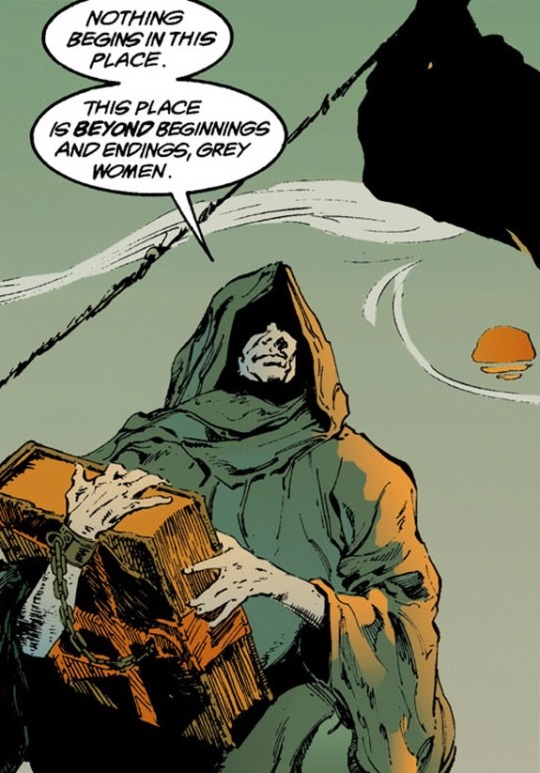
I think of things like the trope "Refusal of The Call" (Call of Destiny) and Geralt of Rivia in The Witcher trying to resist it when he accidentally invokes "Law of Surprise."
For non-Witcher fans I'll explain what Law of Surprise is.
In the show The Witcher, Law of Surprise is basically a simple magical spell invocation. When you call upon "Law of Surprise" toward another person, something that person has but does not yet know they have, now belongs to you.
It can be as random as a new pair of stockings, or perhaps their dog just had a litter of puppies so you get a puppy. Maybe the person's spouse just made their favorite meal. You get a free dinner.
The thing about "Law of Surprise" is once it is invoked it cannot be ignored. What you have done is invoked the power of Destiny itself. And Destiny WILL see to it that you claim the thing you called "Law of Surprise" on. There is no taking it back. There is no refusing it. And you cannot refuse to give the person what they called Law of Surprise on.
In the case of The Witcher, Geralt of Rivia (The Witcher) accidentally invoked "Law of Surprise" in front of a pregnant queen without either of them knowing that she was pregnant at the time.
Horrified and not wanting to take another person's baby, Geralt fled the kingdom.
Twelve years later the kingdom was sieged and Princess Ciri was the only survivor, thus forcing Geralt to accept his Destiny of becoming her adoptive father.
Now, using Geralt as the example, I imagine people who try to ignore the call of Destiny might try to flee (as Geralt literally did) and you have a slow moving embodiment of Destiny closing his big, heavy book, and trudging after him.
For this visual I use the personification of Destiny as he appears in The Sandman by Neil Gaiman.
Geralt (from The Witcher) fleeing on his horse. And back in the distance, down the dusty road, is Destiny (from The Sandman) in his hooded robe, clutching his book under one arm as he sighs in exasperation, following after Geralt for twelve long years.
I may have subconsciously gotten this idea from Death following after the wizard, Rincewind, from Terry Pratchett's Discworld novel, The Colour of Magic.
But when someone tries to escape Destiny and Destiny finds them somehow, this scenario is what I imagine.
An exasperated Destiny personified, slowly trudging after them like The Terminator.
36 notes
·
View notes
Text
The Central Fairytale of the Witcher Saga
‘Or you, perhaps?’ she yelled. ‘If you want I’ll give myself to you! Well? Won’t you sacrifice yourself? I mean, they say I’ve got Lara’s eyes!’
-
The Witcher’s plot is based on a universally known fairy tale, where a monster (or a wizard) saves someone’s life and asks for something in return: “You will give me something you will find at home but do not expect.”
“On this is based the tale A Question of Price (Kwestia ceny) and The Sword of Destiny and at the end of the day, the entire saga”. - A. Sapkowski, Interview
It was usually payment for a favour from a devil. At first, a witcher (a monstrous monster-killer) enacts the fairy tale. Later, a wizard does. In such fairy tales, an oath and hope that the oath will be kept (“Destiny is hope.”) underpin exchanges by which people’s fates are forged.
“Why should anyone want such an oath? You know the answer, Urcheon of Erlenwald. It creates a powerful, indissoluble tie of destiny between the person demanding the oath and its object.” – Geralt, A Question of Price
However, these contracts, exchanges, oaths – in the eyes of destiny they must be proven. For destiny alone is not enough – something more is needed.
What is needed?
“Roegner knew the gravity of the oath he took. He took it because he knew law and custom have a power which protects such oaths, ensuring they are only fulfilled when the force of destiny confirms them. You have no right to the princess as yet. You will win her only when –’
“When what?”
“When the princess herself agrees to leave with you. ... It is the child’s, not the parent’s, consent which confirms the oath, which proves that the child was born under the shadow of destiny.” – Geralt, A Question of Price
Choice is needed.
Destiny becomes true only when the exceptional person subject to it consents or chooses to affirm it.
-
Ciri chooses Geralt. And Geralt, eventually, stops walking away from what he has called into being.
‘Geraaalt!’
He turned around. Ciri was standing on the brow of the hill, a tiny, grey figure with windblown, mousy hair.
‘Don’t go!’
She waved.
‘Don’t go!’
She yelled shrilly.
‘Don’t goooo!’
I have to, he thought. I have to, Ciri. Because… I always do.
‘You won’t get away!’ she cried. ‘Don’t go thinking that! You can’t run away! I’m your destiny, do you hear?’
That’s why they are connected by destiny.
-
In Lady of the Lake, Aen Elle enact the fairy tale, enforcing an analogous contract with Ciri. I say analogous because the Saga has become considerably darker and now concerns Ciri’s coming of age story in a stage where a girl is pushed to become a mother.
In exchange for something Ciri needs (return to Geralt and Yennefer), the elves wish to have her child. Even a “life debt” comes into play in exchange for which the monster (or a wizard!) usually seeks something in return: by way of helping Fate lead Ciri to the Tower of the Swallow, Avallac’h guarantees no threat from the Continent can get to her again – ever. Even the spectres of the Wild Hunt appear on the ice at Tarn Mira in order to deter Leo Bonhart from catching the girl. Ciri slips through the Gate of Worlds and is “safe” (at a price).
Arguably, Ciri owes her life to the Alder Folk in yet another way: her very existence as the Lady of Time and Space – a carrier of mutated Hen Ichaer, the blood of elves – has come about as a result of “a theft.”
“We have the right to demand, and we can, O Swallow. Your father, Cregennan, took a child from us. You will give us one back. You will repay the debt. It seems just and logical to me.” – Avallac’h, Lady of the Lake
The special child the elves seeks in redress for humanity’s theft is destined for great things, and due to the conditions under which the contract with Ciri is agreed upon Ciri’s child will be born under a shadow of destiny in turn.
Interestingly, despite having several means for taking what they need by force, the Alder Folk pursue cooperation. Ciri’s consent in having the child is a surprisingly big priority for the elves (who put faith in the mystical mechanisms of Fate). Even Eredin makes mention of it: “Not completely [prepared to co-operate]? Ha, that’s not good. Since the nature of the cooperation demands that it be complete. It’s simply not possible if it’s less than complete.” Equally, as pertains to the near future, Avallac’h hopes that once she has given birth, Ciri will choose to stay with him and the elves; with her child.
“We want to have your child, O Swallow, daughter of Lara Dorren. Only when you bear it will we permit you to leave here, to return to your world. The choice, naturally, is yours. What is your answer?”
“My answer is no. Categorically and absolutely no. I don’t agree and that’s that.”
“Tough luck. I admit I am disappointed. But why, it’s your choice.” – Avallac’h, Lady of the Lake
Ciri’s choice in choosing her Fate is underscored repeatedly throughout the chapter. As Ciri – the Swallow – is already a Child of Destiny, her choices carry extra weight insofar as they tie into the resolution of many people’s and many worlds’ fate. Destiny becomes proven through her choice.
Naturally, there is a crux: such choices under duress can be considered blackmail.
“The choice, as I said, belongs to you. You ought, however, to know something. It would be dishonest to conceal it from you. You can’t escape from here, O Swallow. So if you refuse to cooperate you will stay here forever, and will never see your friends or your world again.” – Avallac’h, Lady of the Lake
The entire concept of Rumpelstiltskin-like fairy tales echoes blackmail because the favour the monster (or a wizard) extracts in return for his help is usually in some ways inconceivable or impossible to the party who has to fulfil it. The children the witchers take run a higher chance of dying horribly to mutations than becoming vaunted protectors of humanity. For Calanthe it was unthinkable to give up Pavetta to the Urcheon or Ciri to the witcher after losing Pavetta. In turn, at Tir ná Lia, Ciri is not ready to become a mother in the first place.
-
The original bind in the Witcher stipulates it is the extraordinary person’s choice which affirms destiny and makes it become something more, something real. Sapkowski adds a further detail: the sword of destiny has two edges.
‘How do you know Ciri would want to go with me? Because of some old prophecies?’
’No,’ Mousesack said gravely. ‘Because she only fell asleep after you cuddled her. Because she mutters your name and searches for your hand in her sleep.’
...
‘You will not escape, Geralt.’
‘From destiny?’ The Witcher tightened the girth of the captured horse.
‘No,’ the druid said, looking at the sleeping child. ‘From her.’ - Mousesack, Sword of Destiny
Escaping destiny is not an option – neither for the party who has to pay (or be payment), or for the party who is demanding payment. Once an exchange or a debt comes into fruition, the parties are linked with each other for better or worse. Moreover, “not choosing” is not an option either: the debt does not disappear; the bond which binds the parties may manifest itself differently, more terribly; destiny will keep reminding itself in various ways until “fairness” has been served.
As a sidenote, in the end, the nature of this fairness comes down to how the people who find themselves in a bind treat each other.
-
In the light of this fairy tale, it is interesting the wizard who exacts payment at Tir ná Lia sees red when Ciri – for the first time during her stay – actively offers it.
To him.
‘Or you, perhaps?’ she yelled. ‘If you want I’ll give myself to you! Well? Won’t you sacrifice yourself? I mean, they say I’ve got Lara’s eyes!’ – Ciri, Lady of the Lake
Thematically, this is significant. For Avallac’h has been subject to destiny himself – with Lara. He carries Elder Blood – like Ciri.
What Auberon tries to teach Ciri, Crevan already knows: in every moment, infinite futures begin and countless pasts end as a result of our choices; choices, which, informed by our pasts and hopes for futures, shape how we perceive and interact with the present moment in which we take action.
“The ancient Ouroboros reminds us that in every moment, in every instant, in every event, is hidden the past, the present and the future. Eternity is hidden in every moment. Every departure is at once a return, every farewell is a greeting, every return is a parting. Everything is simultaneously a beginning and an end.” – Auberon, Lady of the Lake
In the end, this is how fate shapes up.
Avallac’h believes in Ithlinne’s Prophecy, prophesizes himself, and acts in ways that steer the workings of Fate (as does Geralt in a minor way by calling the Law of Surprise; acting as Ciri asserts one must do: “You can’t just sit and do nothing! Nothing comes by itself!”). Arguably, he knows the rules – he knows the powerful, indissoluble tie of destiny is formed when an exceptional person subject to it affirms it, chooses it, and consents to it. For destiny to become destined, you have to actively pursue it. Moreover, Crevan already considers Ciri’s fate as bound to his own, telling Geralt point-blank under Mount Gorgon – after a small, thoughtful or anxious, hesitation – “someone else will help her now. You can’t be so arrogant as to think that the girl’s destiny is exclusively bound to you.”
Now though, irony strikes.
Now Avallac’h has Ciri, the Child of the Elder Blood, offering to form this bond; offering herself to him alongside a jab about the eyes of Lara, which surely make the matter of destiny obvious. Now the wizard, who has not come to grips with the nature of his fate so far – analogously to the witcher who in Brokilon kept walking away from from the bond he had called into being – is being told by the child of destiny that Ciri – not Lara – will give herself to him, consenting to bringing about a fate the woman Avallac’h loved(s) in the end did not choose to bring about.
Ciri never makes an active choice in regard to Auberon. She goes along with the circumstances, but it does not work with Auberon for the same reason it does not work with Emhyr – Ciri reminds Auberon of his daughter. It does not work with Auberon because destiny alone is not enough. Moreover, destiny from which we walk away can manifest in different ways (Ciri eventually closes the circle for Auberon, as Death). Auberon continues to walk away from Ciri at every moment when Ciri might come to believe “choosing” him is an option she could make. That she herself is chosen. But things do not pan out the way she expects, and then she acts. Her position: it is clearly not working with Auberon, thus it is clearly not my destiny to have this child with him; but I want to fulfil the contract, I’ll choose you if you want – what do you say?
In its frustration and desperation, Ciri’s offer to Avallac’h comes off as a perversion of the way Ciri first chooses Geralt.
Standing on a hill, Ciri tells Geralt that he cannot run away. That she is her destiny. Before which Mousesack reminds Geralt: “What you wanted and what you planned to do ceased to matter [from the moment Ciri was born], and what you don’t want and what you mean to give up doesn’t make any difference either. You don’t bloody matter!”
Avallac’h wanted Lara, planned to have a child with Lara, and was probably willing to give anything for Auberon’s daughter not to make the decisions she made. It did not make a difference. Avallac’h wants the Swallow to have the promised child with Auberon, to stay with the child, to choose her elven ancestor’s path as it should have been. It does not make a difference, and the alternative is himself and his laboratory. Except for some reason the alternative spooks the devil (or a wizard) who demands payment for a debt. As ever, in the end the matter is personal. Because why-why-why is the tale twisting so that instead of Lara, now this monstrous girl is making offers that bear weight on the shaping of fates?
‘In accordance with the Law of Surprise and eternal custom, the decision is yours. Answer. One word from you is enough. Yes, and you become the property, the conquest, of this monster.
No, and you will never have to see him again.’ - Calanthe, A Question of Price
In truth, Avallac’h is incapable of accepting that what he wants to be his destiny simply does not matter. It becomes highlighted in the moment when Ciri – a surprise twist by Fate – straightforwardly tells the wizard she chooses him to do what Avallac’h was once upon a time meant to do with a different woman, whose debt and eyes Ciri bears.
Insofar as the world of the Alder Folk mirrors in a twist what happens on the Continent - consider the irony of twisting this fundamental fairy tale that underlies the Witcher’s story. And consider the costs.
Consider for a moment if Avallac’h had accepted.
Consider for a moment if Geralt had not tried walking away.
Much would have been different.
---
If you like my writing, consider supporting me via Ko-Fi.
Thanks! ❤️
#the witcher#wiedźmin#law of surprise#sword of destiny#lady of the lake#ciri#geralt of rivia#aen elle#avallac'h#lara dorren#auberon#rumpelstiltskin#fairy tales#the witcher meta#andrzej sapkowski#cirilla fiona elen riannon
71 notes
·
View notes
Text
Are there any fics out there in which Ciri is Yennefer's child surprise? I think that could be really intriguing
#the witcher#yennefer of vengerberg#ciri#ciri of cintra#cirilla fiona elen riannon#cirilla of cintra#law of surprise#twn#fic request#fanfiction
11 notes
·
View notes
Link
Chapters: 13/15
Fandom: The Witcher (TV), Wiedźmin | The Witcher Series - Andrzej Sapkowski
Rating: Teen And Up Audiences
Warnings: Graphic Depictions Of Violence
It soon turns out that, for once, destiny is not a bitch, neither metaphorically, nor literally.
With the first light of the new morning and the merry chirruping of the awakening birds, Cahir walks along the forest path, not alone but in the company of Gunwald, the peasant he saved from certain death, and Birte, his mule. The horrors of the night are soon, well, not forgotten, but fading into the background, or subconsciousness. The day promises to be sunny and warm and with the prospect of a good meal in addition to, perhaps, a nice surprise, whatever it may consist of - well, the nature of a surprise is that you do not know, right? - the general outlook as well as Cahir's mood are particularly good for once. Perhaps the light buzz from the remarkably potent and reviving hooch is also contributing to his exceptionally high spirits despite the lingering aftereffects of the concussion, the slight ache and stiffness in his shoulder and arm, and the smarting, itching blisters on his leg. It cannot be ruled out, no. In any case, not even Gunwald's constant chitchat can dampen the strong sense of optimism that somehow and quite suddenly has taken root in Cahir's heart. Or is it the effect of the mandrake root? No matter what, against all odds and reason - and although, according to what Gunwald tells him about the current political situation and the latest developments regarding the war, they are caught speck in the middle of the advancing Nilfgaardian army and the equally advancing Temerians - things will get better from today on, Cahir feels it in his guts. It cannot be otherwise.
He is not wrong, at least not at first ...
Continue reading on Ao3:
https://archiveofourown.org/works/40814940/chapters/114863704

#the witcher#the witcher fanfiction#cahir mawr dyffryn aep ceallach#eamon farren#the hansa#geralt's hansa#geralt of rivia#regis#emiel regis#zoltan chivay#milva barring#henry cavill#meng'er zhang#the witcher netflix#the witcher books#baptism of fire#fen carn#law of surprise
2 notes
·
View notes
Text

I’m am literally so fucking mad about this. The show did not explain the Law of Surprise right at all.
2 notes
·
View notes
Text
Law of Surprise is the medieval equivalent of your parents selling you to One Direction.
2 notes
·
View notes
Link
Chapters: 2/?
Fandom: Wiedźmin | The Witcher - All Media Types, Wiedźmin | The Witcher (Video Game)
Rating: Not Rated
Warnings: No Archive Warnings Apply
Characters: Lambert (The Witcher), Keira Metz, Eskel (The Witcher), Original Female Character(s), Original Male Character(s)
Additional Tags: The Law of Surprise (The Witcher), Post-The Witcher 3: Wild Hunt, mini chapters
Summary:
Lambert makes a stupid mistake, and learns that Destiny is far more cruel than he ever could have imagined.
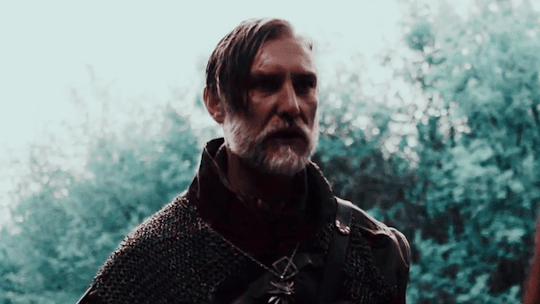
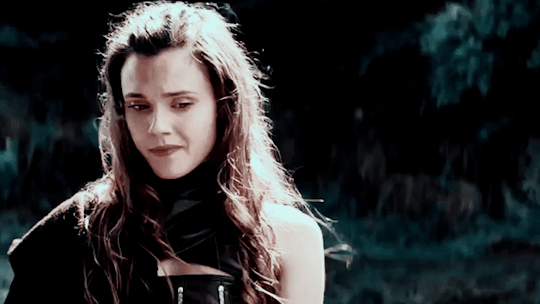
#witcher 3#law of surprise#lambert#witcher lambert#oc: vivi#self-indulgent fanfic#come indulge with me :)#dad lambert#but he's not doing a very good job
4 notes
·
View notes
Text
Law of Surprise - The Witcher
I have only seen the TV show version, and haven't read the books, so I'm not sure how well my theory will hold up. And maybe someone else has already thought of this theory.
At first when I watched The Witcher, the law of surprise interested me and I tried doing some research into whether this was a real thing, or simply something that the author had made up. The only information that I could find about it was that it was part of the fantasy world of the Witcher, and so I assumed the law of surprise was something that the author had invented.
I disregarded my search for the origins of the idea of the Law of Surprise and went about my life.
Today, when I was reading fairy tales I read a story called Jack My Hedgehog (also commonly Hans My Hedgehog) and I believe that this story was where the concept of the Law of Surprise began.
The story is about a man, Jack, who was born with the legs of a human but the torso and head of a hedgehog. Eventually he ended up living by himself in the woods because his parents didn't like him that much. When in the woods, a lost king heard him playing bagpipes followed the sound. Jack agreed to show the King the way home if the King would give him his written promise to let him have whatever first met him on his return. The first thing the King saw on his return was his daughter. But on the written agreement the King had wrote that he would not give Jack anything so Jack left. This happens again with a second King, but this King is willing to honor his word. Jack goes back to his forest though.
Jack gets tired of living in the forest and wants a wife. He breaks into the palace of the first King and demands his daughter. The King fears Jack so he gives him his daughter. Jack ends up poking the daughter with his quills for her father's original treachery. Jack then goes to the second King, and again asks what he was owed. This princess is willing to honor the deal and so Jack sheds his hedgehog skin, burns it, and then he become a beautiful human man set to inherit the kingdom.
I think that this must be the origin for the Law of Surprise because of the nature of the deal that Jack and the Kings made (promise to let him have whatever first met him on his return) and the half hedgehog half human thing.
The deal is incredibly similar to the Law of Surprise and quite possibly what inspired it.
This is backed by the fairytale, which is very similar to Duny from the Witcher, a half man half hedgehog, who asked for the Law of Surprise as payment for saving the King.
2 notes
·
View notes
Text
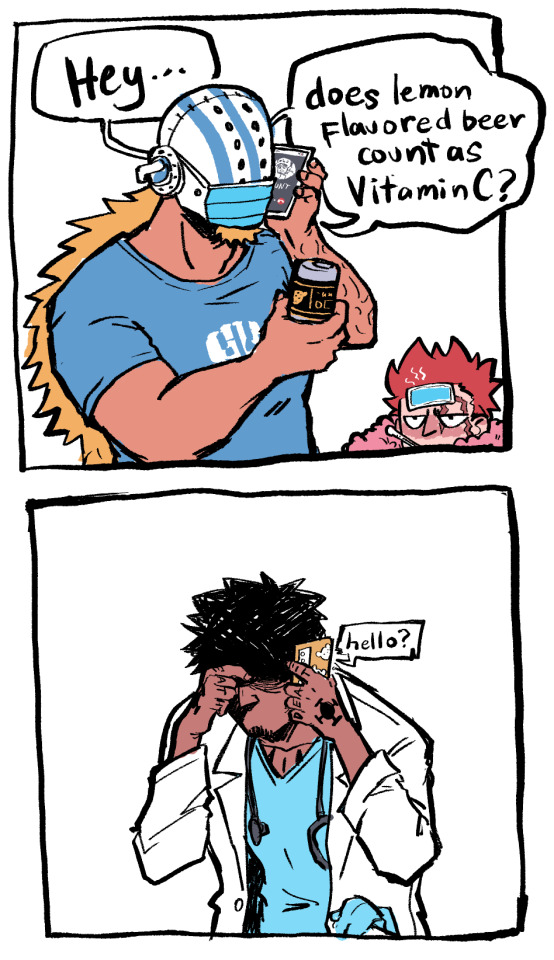
like hiring a horse to dogsit
#based on an actual conversation ive had#trafalgar law#killer#massacre soldier killer#op killer#can we just settle on killer's actual tag like actually?#eustass kid#eustass kidd#this may come as a surprise but i was killer in that conversation#ross then proceeded to compute the actual ascorbic acid content relative to my body mass and i just continued drinking#that band au#forgot that tag#tw alcohol
6K notes
·
View notes
Text
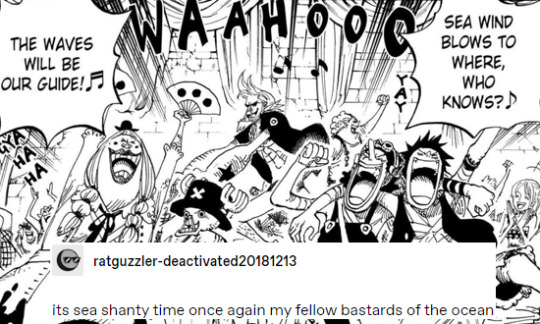
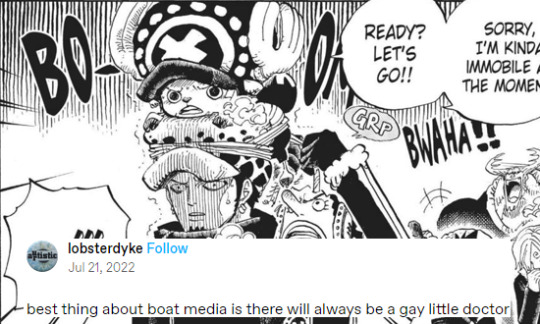


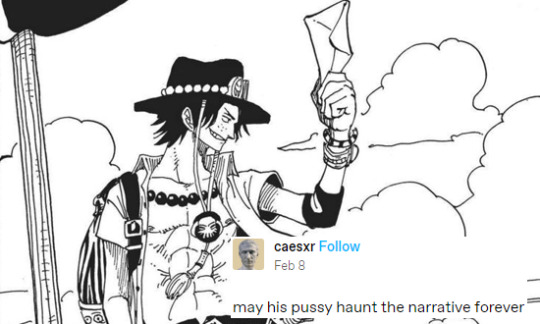
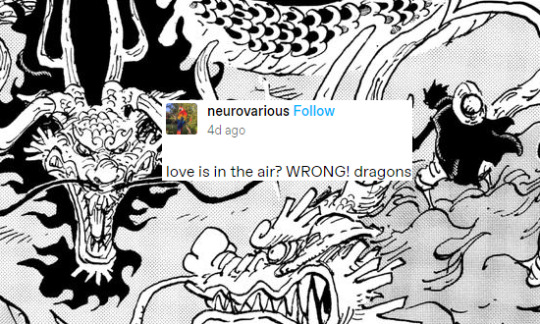
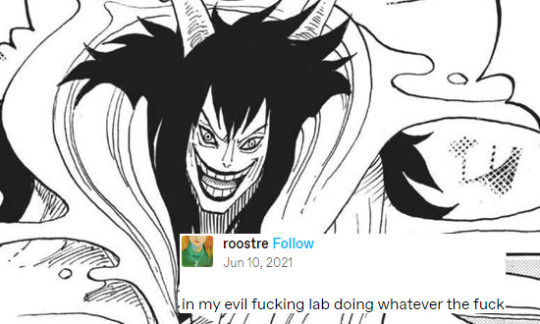

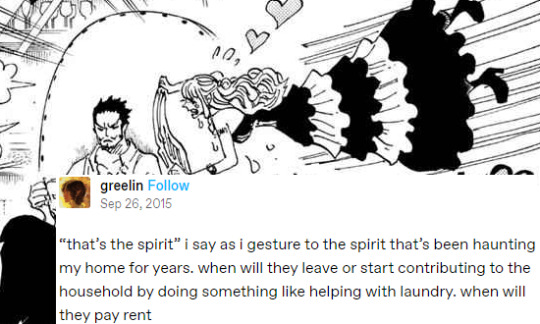

One Piece + Tumblr text posts, 1/?
#onepieceedit#one piece#trafalgar law#tony tony chopper#soul king brook#sir crocodile#buggy the clown#dracule mihawk#portgas d. ace#kaido#kozuki momonosuke#caesar clown#eustass kid#massacre soldier killer#ghost princess perona#flame emperor sabo#cross guild#my stuff#the second to last one is very old so i wouldn't be surprised if someone has already used it for them but i simply had to. it's them
917 notes
·
View notes
Note
Idk why, but I imagine Lyney introducing his s/o to Arlecchino
⁺ ⋆˚ Kafka Anon
I think it's highly likely Arlecchino would know of your existence way before Lyney introduces you to her.
It's nothing complicated, she must be updated with the whereabouts of her children. If Lyney has gotten that close to you, it'd mean that the rest of the House also know and accept you as ‘family’. It'd not be that difficult for the news to reach Arlecchino then, let's say through one of Lyney's ‘siblings’.
Arlecchino is not against this relationship at all. Lyney is more impatient and unorganized than he lets on and he requires someone more grounded to keep his wits in troublesome situations. It's a good thing you're capable of handling him, since poor Lynette can babysit him for so long. You also make a good incentive in keeping Lyney motivated enough to continue his ‘training’ as her successor. Your presence in his life is beneficial in every aspect.
But Arlecchino still pretends to be surprised when Lyney actually does it, if just to tease him a little. What, she has playful moods every once in a while, too, you know?
#imagine your surprise when you see the alleged 'father' for the first time#like lyney you didn't tell me your dad was a handsome woman D:#arlecchino best father/mother in law???#──⚝ kafka anon#lyney brainrot#arlecchino brainrot#lyney x reader#yandere lyney#yandere lyney x reader
255 notes
·
View notes
Text
I said I wasn't going to get started on the topic of Aveline ruining Carver's chances with the guard but I lied okay, it's Carver Hawke defense hours.
Here's the thing; it doesn't matter if you believe Carver was or wasn't fit for the guard. That's a different debate that I'll get to. What matters is Aveline's in no position to tell the guard not to accept his application. Why does she think that's her right to judge whether or not he's fit?
Carver should've had the chance to prove himself one way or another. If it turns out he's not a good fit, then let him fail. Let him learn from it.
"Oh but failure could mean lost lives-"
Aveline doesn't get to talk shit about failure and the people. Plenty have died on her watch yet she still believes she's a good guard and Guard-Captain.
"maybe Aveline's protecting him, Carver could die while on patrol-"
Carver could die working in the Bone Pit, or serving as a templar, or when he's running around with Hawke. Carver could trip and fall down a set of stairs and die. In fact, he can die in the Deep Roads, somewhere he wouldn't have to go if the Hawke's weren't desperate.
Either Carver fails as a guard, or more likely, he succeeds and proves himself worthy of it.
But let's be real, Carver probably kept getting rejected due to being a Fereldan with a past of smuggling/mercenary work and Aveline only reaffirmed the decision, either because they asked her what she thought or she stuck her nose in unprompted.
But what irritates me is that she admits to telling them not to accept his application, and then has the balls to call Carver too proud to take up a trade or find another line of work.
Carver tells her, "And who would take on a Fereldan apprentice? Maybe in another year I could work my way up to pissboy." He has a good point here. Aside from the guard, the only other place Carver could work and use his skillset is with the Templars. Or go back to mercenary/smuggling work.
And Aveline doesn't even have a real answer for him. No suggestions, no encouragement, nothing. Just "Fine, let's crawl down some holes. Good bloody luck for your sake."
Also, if you do the Mark of the Assassin DLC in Act 1-
Aveline: You should see if any of the noblemen are looking for new men-at-arms.
Carver: Are you trying to get rid of me?
Aveline: It's a role with some autonomy. A good fit with your training and... tendencies.
Carver: After serving King Cailan? You want me to suffer some poncy git who needs two servants to wipe his own ass? I'll find my own way, thanks.
Aveline: I wish you would.
You wish he would?? Aveline, he was trying to find his way into the guard, a position he'd make a good fit for, and you helped deny him of it because YOU didn't think he would be good enough, I just-
If I haven't made it clear yet, I firmly believe that Carver would've made a great guard. He wants to help people, to be a protector. He's loyal, and despite what Aveline claims, he can follow orders and take his duty seriously. We see him do incredibly well with the Grey Wardens, after all. If he were a guard, he wouldn't have to go down into the Deep Roads with Hawke, and I think he would've been okay with that! He's so hurt and bitter when you leave him behind because that effectively tells him, "I don't need you." Carver's spent the whole first act telling you he wants to go on the expedition aka that he wants to be needed.
But if he were a guard, he would be needed elsewhere. He'd be in training as a recruit. He'd look after Leandra while you go. He wouldn't be backed into a corner with no income and only the templars left as his chance at forging his own path and providing for his family.
He doesn't get that opportunity, though.
By the way, if he becomes a warden, you can get this banter:
Aveline: I'm glad you found a place with the Wardens.
Carver: Well, it's not the city guard, but it'll do.
Aveline: Carver... it wasn't the place for you.
Carver: No, it's all right. It is. It cost a lot, but I get it. I really was a bit of a tit those days, wasn't I?
Aveline: Well...
This banter makes me want to scream.
Aveline's just... she's so insistent that she's right. She's someone who will double down rather than entertain the idea that she's wrong and it's not just with Carver and the guard, it's with everything. The "my beef with Aveline" list gets longer and longer every time I replay da2, I swear.
Say what you will about Carver, whether you think he would've been a good fit or if Aveline's right and it wasn't for him, he was denied a chance and it cost him so much in the end. He either dies, or he joins the templars where he deals with Chantry's bullshit trying to brainwash him with "mages aren't people" and "magic is a cancer in this world", or he's infected with the blight and becomes a Grey Warden, forced to serve the rest of his life fighting darkspawn, tormented by voices and nightmares.
I will never not be bitter about this.
#dragon age 2#da2#dragon age#carver hawke#aveline vallen#aveline critical#oh and also forever bitter that hawke doesn't have the option to talk to aveline about this#because listen my hawke would be on this#carver would be annoyed and all 'i don't need your help >:[' but that's not gonna stop ed from turning on Big Brother Mode#this is just one of many reasons i can't do the friendship path with aveline#i hate the thought of doing rivalries for all my other companions but i feel like aveline's rivalry route is the only chance to shake her#of her unwarranted over confidence and make her realize that she's not this lawful good 'i stand for all of us' guard captain#she still stands with me in the end but at that point i wouldn't be surprised if she was just doing to because she still feels she owes ed#for getting her outta fereldan and into kirkwall rather than because we're loyal best friends y'know?#she's certainly not doing it for the mage rights#but anyway i never miss an opportunity to defend carver#that's my baby brother and i love him
812 notes
·
View notes
Text
there's no way that other people haven't realized that arthur is blind (or think he is partially). like this man looks vaguely in people's directions, almost misses chairs frequently, and doesn't notice objects in plain sight.
i fully believe daniel and oscar noticed SOMETHING was wrong within like 10 min of being around him and haven't said anything to be polite
#malevolent#arthur lester#im so surprised only the butcher has said something#especially daniel imagine your son in law went from making eye contact with you to almost falling on his ass and missing your chair 😭
223 notes
·
View notes
Text
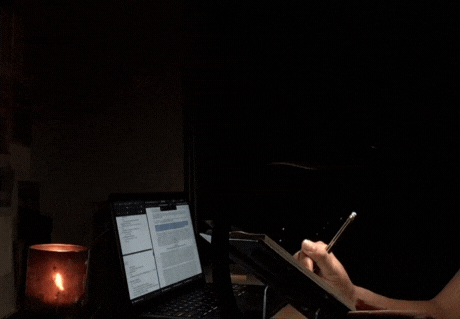
bringing you gentle vibes from a midnight finals session. if you’ve started studying later than you’d planned, it’s okay-- take a deep breath and begin.
#sam screams#studyblr#lawblr#study vibes#dark academia#light academia#chaotic academia#law school#uni#deskspo#studyspo#study motivation#studygram#bro its FINALS WEEK and my first finals week in law school was me having multiple panic attacks#now im just kind of#the word isnt complacent really but id say im at peace#i'm just surprised i'm here i'm always surprised and grateful
556 notes
·
View notes
Text
Plans for tonight: studying physics and psychology and not being pressed about anybody’s dumbass son ‼️🎀🥂💕
#man who is hot? we don’t care#we stay focused on the goal#saw the 28 year old grad student I had a psychotic crush on for the longest time but he’s licherally none of my business#you know what my business is? bernoulli’s law bitch#i was like 20 and he was 27 at the time of us talking and I’m to this day surprised we talked however brief it was#the daddy issues really shone w this one#guys my age suck too so in conclusion we just avoid men for the time being#instead of having toxic thoughts about looking as hot as possible to get his attention I will instead do these physics questions. bless#p
161 notes
·
View notes
Text

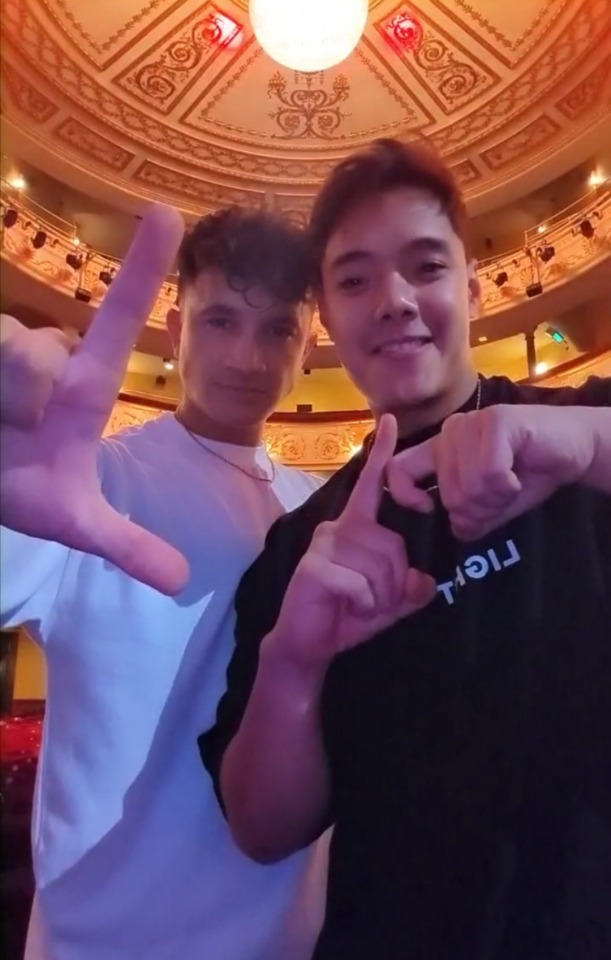
The actors of L and Light in Death Note the Musical London (Dean John-Wilson and Joaquin Pedro Valdes) went on IG live in matching Lawlight shirts 🥹
#death note#death note musical#death note musical London#death note the musical#light yagami#l lawliet#lawlight#they've been so dedicated to the black/white matching outfits but this one is just A Lot lol#I thought at first the shirts just said L and Light and I was like yeah that's normal#imagine my surprise when dean moved and I realized it said “Law” 😭😭😭#they seem to really love the show and the characters they were talking about it so excitedly and everything#the dedication is overflowing fr I can't help but appreciate it#also they were trying to make Lira a thing for a little while so I'm kind of glad they switched to this lmao
351 notes
·
View notes